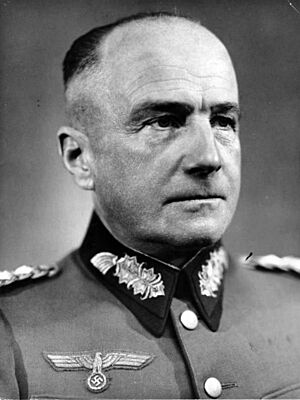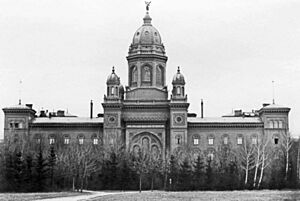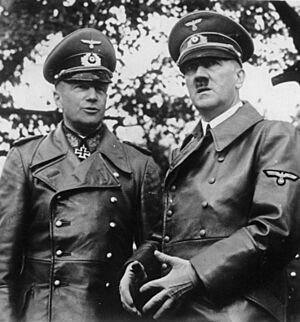Walther von Brauchitsch facts for kids
Quick facts for kids
Walther von Brauchitsch
|
|
|---|---|

Brauchitsch in 1939
|
|
| Commander-in-Chief of the German Army | |
| In office 4 February 1938 – 19 December 1941 |
|
| Chancellor | Adolf Hitler |
| Preceded by | Werner von Fritsch |
| Succeeded by | Adolf Hitler |
| Personal details | |
| Born |
Walther Heinrich Alfred Hermann von Brauchitsch
4 October 1881 Berlin, Prussia, German Empire |
| Died | 18 October 1948 (aged 67) Hamburg, British-occupied Germany |
| Resting place | Salzgitter |
| Spouses |
Elizabeth von Karstedt
(m. 1910; div. 1938)Charlotte Rueffer
(m. 1938) |
| Children | 3 |
| Relatives | Adolf von Brauchitsch (brother) |
| Signature | |
| Military service | |
| Allegiance | |
| Branch/service | Imperial German Army Reichswehr German Army |
| Years of service | 1900–41 |
| Rank | Generalfeldmarschall |
| Battles/wars | |
| Awards | Knight's Cross of the Iron Cross |
Walther von Brauchitsch was a top German military leader during the early years of World War II. He was a Generalfeldmarschall (which means Field Marshal, a very high military rank) and the Commander-in-Chief of the German Army.
Born into a family with a long history of military service, he joined the army in 1901. He fought bravely in World War I on the Western Front. After the Nazis came to power in 1933, Brauchitsch became an important figure in the German military. He was the Commander-in-Chief of the German Army from 1938 to 1941. He helped plan and lead major battles, including the Battle of France and the invasions of Yugoslavia and Greece. For his success in France, he was promoted to Field Marshal.
In late 1941, after suffering a heart attack and being blamed for a failed attack on Moscow, Brauchitsch was removed from his position. He lived in retirement for the rest of the war. He passed away in 1948.
Contents
Early Life and Military Start
Walther von Brauchitsch was born in Berlin, Germany, on October 4, 1881. He was the sixth child of Bernhard Eduard von Brauchitsch, who was a cavalry general. His family had a long history of serving in the military. Walther grew up following the traditions of a Prussian officer. His family was part of Berlin's high society.
When he was a teenager, Brauchitsch was interested in politics and art. To support these interests, his father sent him to a special school called Französisches Gymnasium Berlin, instead of a military academy.
In 1895, Brauchitsch joined the military academy in Potsdam. He later moved to another academy, Hauptkadettenanstalt Groß Lichterfelde. In his last year there, he was in the top class for talented students. He was even chosen to be a page (a young attendant) for Empress Augusta Victoria, just like his brother Adolf had been. Serving the Empress taught him good manners and how to carry himself, which people noticed throughout his life.
In 1900, he became a lieutenant in an infantry regiment. Because of a medical condition, he was not suited for infantry service. So, he was moved to an artillery regiment. He was in charge of training new soldiers in riding and driving. Later, he joined the General Staff office in Berlin, where he was promoted to first lieutenant in 1909.
World War I Service
When World War I began in August 1914, Brauchitsch was a captain. He became a staff officer for the XVI Army Corps, which was located near Metz. During the war, he served with different infantry and reserve units.
Between 1914 and 1916, he took part in important battles like the Battle of Verdun and the Battle of the Argonne Forest. In the last two years of the war, Brauchitsch also fought in battles such as the Third Battle of the Aisne and the Battle of Flanders. By the end of the war, he had earned the Iron Cross 1st Class and the House Order of Hohenzollern. He finished the war as a major.
After World War I
After World War I ended in 1918, Brauchitsch was temporarily released from service. However, he returned as a major the next year. The German military was greatly reduced in size because of the Treaty of Versailles, a peace agreement. Despite this, Brauchitsch managed to stay in the army. He continued to work with the General Staff.
In 1920, he was allowed to transfer to the staff of the 2nd Artillery Regiment. The next year, he worked in the Ministry of the Reichswehr (the German defense ministry) in the Artillery Department. His job there was to reorganize artillery units and use the lessons learned from the war. He also emphasized how important it was for artillery and infantry to work together.
In 1925, he was promoted to lieutenant colonel. By 1927, Brauchitsch became the Chief of Staff of the 6th Infantry Division in Münster. This was one of the strongest military bases in western Germany. In the final years of the Weimar Republic (the German government before the Nazis), he led the Army Training Department and became a colonel in 1928. In October 1931, Brauchitsch was promoted to major general.
Rise in Nazi Germany
In 1933, Adolf Hitler and the Nazi Party came to power in Germany. They began to make the military much stronger, preparing for Hitler's plans. On February 1, 1933, Brauchitsch was made commander of the East Prussian military district. He was also the chief of the 1st Division in Königsberg.
Brauchitsch was promoted to lieutenant general in October 1933. In 1935, he became the first commanding general of the 1st Army Corps.
He had some disagreements with Erich Koch, the local Nazi party leader. Koch was known for being difficult and using his power. Brauchitsch tried to keep their arguments quiet so that Berlin wouldn't find out.
Later, Brauchitsch learned that Heinrich Himmler, the head of the SS, wanted to replace army guards in East Prussia with SS men. Brauchitsch managed to stop the SS from taking over the army's role in the region. He simply stated that "Civilians are not allowed to enter that area."
Brauchitsch became a general of artillery in 1936. On February 4, 1938, Hitler promoted Brauchitsch to colonel general and made him the new chief of the army. This was recommended by the Army High Command. Brauchitsch was happy with the Nazi policy of making the army stronger.
Brauchitsch did not agree with Hitler's plans to take over Austria (called the Anschluss) and Czechoslovakia. However, he did not actively try to stop Hitler's war plans, preferring to stay out of politics. In April 1939, Hitler gave Brauchitsch the Golden Party Badge to celebrate the occupation of Czechoslovakia.
In the months before World War II, Brauchitsch also focused on Italy's possible help for the German military. He visited Italian military bases to strengthen the alliance between Italy and Germany.
World War II Leadership
During the invasion of Poland in 1939, Brauchitsch oversaw most of the plans. This campaign is often seen as the first example of "blitzkrieg" (lightning war). However, blitzkrieg wasn't a formal plan at the time. The way the German army fought in Poland was more traditional. The true blitzkrieg tactics developed after the invasion of Western Europe in 1940. Brauchitsch himself had to be convinced that armored divisions could operate independently before the campaign.
Brauchitsch supported strong actions against the Polish people. He believed these were necessary for Germany's goals.
Planning for Western Europe
By November 1939, Brauchitsch and his Chief of the General Staff, Franz Halder, were worried about Hitler's plan to invade France. They thought the invasion would fail. Brauchitsch tried to convince Hitler to delay the attack, saying that the German Army's morale was low.
Hitler became very angry, accusing Brauchitsch and the General Staff of being disloyal and cowardly. After this meeting, Brauchitsch and Halder felt they could not go against Hitler. Hitler later called a meeting where he declared he would defeat the West within a year. He also threatened to "destroy the spirit of Zossen," which was the army headquarters. This threat made Halder very nervous, and he stopped any plans against Hitler. Heavy snowstorms then caused Hitler to postpone the invasion, which eased the immediate pressure on Brauchitsch and Halder.
While preparing for the Battle of France, General Erich von Manstein proposed a new plan called Sichelschnitt ("sickle cut"). Brauchitsch and Halder did not like this plan at first. Manstein then presented his plan directly to Hitler. The next day, Hitler ordered Brauchitsch to accept Manstein's plan, which Hitler presented as his own idea. Despite his initial doubts, Brauchitsch eventually saw that the plan could lead to success in France.
After France fell surprisingly quickly, Brauchitsch was promoted to Field Marshal in July 1940. He and other high-ranking officers expected an easy victory against Great Britain next. He was confident that Britain would be easily defeated. However, the German air force could not gain control of the skies over Britain, so the plan to invade Britain (called Operation Sealion) was cancelled.
In April 1941, Germany quickly invaded and occupied Yugoslavia and Greece. Brauchitsch was in overall command of the German forces, which included many soldiers, tanks, and other vehicles. By the end of the month, both countries were under German control.
Invasion of the Soviet Union
Brauchitsch told his army and commanders to stop criticizing Nazi policies. He said that strong actions were needed for the "forthcoming battle of destiny of the German people." When Germany invaded the Soviet Union in June 1941, in an operation called Operation Barbarossa, Brauchitsch again played a key role. He made changes to the original plan. He did not object when Hitler gave the German army instructions similar to the SS regarding how to treat people in occupied areas.
As the Battle of Moscow began, Brauchitsch's health started to decline. Even so, he kept working, determined to capture Moscow before winter. The army's failure to take Moscow angered Hitler. Brauchitsch's health worsened, and he suffered a heart attack in November. He was also told he had a serious heart condition.
Retirement
After the failure at Moscow, Brauchitsch was removed from his position as Commander-in-Chief of the German Army on December 19, 1941. He was moved to the Führerreserve (an officer reserve list), where he remained without a new assignment until the end of the war. He never met Hitler again. He spent the last three years of the war living at his hunting lodge in the Brdy mountains.
Later Life and Passing
In August 1945, after the war ended, Brauchitsch was arrested by the British. He was held in a prison camp in South Wales and later moved to a British military hospital. He was held until August 1948. The British government announced that he would face trial before a British military court. However, he passed away on October 18, 1948, at the age of 67, from pneumonia in a British-controlled military hospital in Hamburg. He died before he could be put on trial.
Family Life
In 1910, Brauchitsch married Elizabeth von Karstedt. She was a wealthy heiress. They had a daughter and two sons. One of their sons, Bernd von Brauchitsch, later served in the German air force during World War II. Walther and Elizabeth divorced in 1938 after 28 years of marriage.
After his divorce, Brauchitsch married Charlotte Rueffer, who was the daughter of a judge.
Walther von Brauchitsch was also the uncle of Manfred von Brauchitsch, a famous race car driver in the 1930s. He was also related to Hans Bernd von Haeften and Werner von Haeften, who were part of the German resistance movement against Hitler.
How He is Remembered
Historians have different views on Walther von Brauchitsch. Some describe him as a very skilled professional soldier who followed military traditions. However, they note that he lacked the strong personality needed to stand up to Hitler. Other historians describe him as a "spineless individual" who was afraid of Hitler and not suited to lead any kind of opposition.
Awards and Honors
- Iron Cross (1914) 2nd Class (1914) & 1st Class (1915)
- Württemberg Friedrich Order with Swords (1915)
- Knight's Cross of the House Order of Hohenzollern with Swords (1917)
- Saxe-Meiningen Honour Cross for War Merit (1918)
- Service Award for 25 service years (1920)
- The Honour Cross of the World War 1914/1918 (1934)
- Wehrmacht Long Service Award 1st Class (1936)
- Order of Merit of the Kingdom of Hungary 1st Class (1938)
- Star of the German Red Cross Decoration (1938)
- Grand Cross of the Royal Italian Order of Saints Maurice and Lazarus (1939)
- Grand Cross of the Order of the White Rose of Finland (1939)
- Golden Party Badge (1939)
- Order of the Yugoslav Crown 1st Class (1939)
- Sudetenland Medal with Clasp (1939)
- Clasp to the Iron Cross (1939) 2nd Class (1939) & 1st Class (1939)
- Knights Cross of the Iron Cross (1939)
- Spanish Military Merit Cross 1st Class (1939)
- Spanish Imperial Order of the Yoke and Arrows, Grand Cross (1940)
- Grand Cross of the Royal Bulgarian Order of St Alexander with Swords (1941)
- Grand Cross of the Royal Hungarian Order of Merit with Swords (1941)
- Grand Cross of the Romanian Order of Michael the Brave (1941)
- Slovak War Victory Cross 1st Class (1941)
- Grand Cross of the Finnish Order of the Cross of Liberty (1942)
- Japanese Order of the Rising Sun 1st Class (1942)
Military Ranks Held
- Leutnant (Second Lieutenant) – March 22, 1900
- Oberleutnant (First Lieutenant) – October 18, 1909
- Hauptmann (Captain) – December 18, 1913
- Major (Major) – July 15, 1918
- Oberstleutnant (Lieutenant Colonel) – June 1, 1923
- Oberst (Colonel) – April 1, 1928
- Generalmajor (Major General) – October 1, 1931
- Generalleutnant (Lieutenant General) – October 1, 1933
- General der Artillerie (General of Artillery) – October 1, 1935
- Generaloberst (Colonel General) – February 4, 1938
- Generalfeldmarschall (Field Marshal) – July 19, 1940
See also
 In Spanish: Walther von Brauchitsch para niños
In Spanish: Walther von Brauchitsch para niños
- Corruption within the Wehrmacht
 | Kyle Baker |
 | Joseph Yoakum |
 | Laura Wheeler Waring |
 | Henry Ossawa Tanner |



